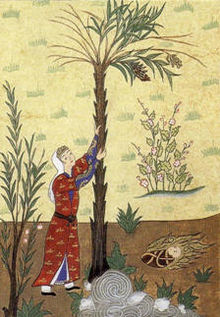Loading AI tools
Muhja bint al-Tayyani al-Qurtubiyya (Arabic: مهجة بنت التياني القرطبية) (born in Córdoba, died in Córdoba 1097 CE) was an eleventh-century Andalusian poet.[1][2]
Muhja bint al-Tayyani | |
|---|---|
| Born | 11th century Córdoba, Al-Andalus (now Spain) |
| Died | 1097 Córdoba, Al-Andalus (now Spain) |
| Occupation | Poet |
| Language | Arabic |
| Nationality | Andalusian |
| Notable works | Satires and love poems |
She was the daughter of a Cordoban merchant who was engaged in the sale of figs.[3] At some point, she met the famous poet Princess Wallada, who took her into her house — which served as a school of poetry for women — and mentored her.[3] Muhja became a celebrated poet, a profession that had a great recognition in Andalusian society.[4] Wallada was extremely fond of Muhja, writing her passionate (and rather explicit) love poetry, and there are suggestions they may have been lovers.[1][5][6]

Muhja dedicated ferocious satires to her teacher:[7]
| Original[8][9] | Transliteration (ALA-LC) | Literal translation |
| وَلّادة قَدْ صِرْتِ وَلّادة | Wallādah qad ṣirti wallādah
min ghayri baʿalin faḍaḥa al-kātimu ḥakat lanā Maryam lākinnah nakhlat hādhī dhakaru qāʾimu. |
Wallada has become fecund
by another man; the secret-keeper revealed it. To us, she resembled Mary, but this palm-tree is an erect penis. |
This poem puns on Wallada's name, which literally means 'fecund'. It compares Wallada, ostensibly pregnant out of wedlock, to the Virgin Mary. The poem shifts from a literary register in the first half to a colloquial one in the second (characterised by the colloquial form hāḏī in place of classical hāḏihi). The second half alludes specifically to the Islamic account of the virgin birth, in which Mariam received a divine instruction to shake the trunk of a date palm while giving birth to Jesus, so that its fruits fall down to her. In Muhya's account, Wallada has grasped a penis to similar effect.
Another example is this verse:
يا متحفا بالخوخ أحبابه |
Away from the gouache of his lips |
Sobh, Mahmud (2002), "Wallada bent al-Mustakfi. Muhya bent al-Tayyani", Historia de la literatura árabe clásica, Madrid: Cátedra, pp. 952–957.
Wikiwand in your browser!
Seamless Wikipedia browsing. On steroids.
Every time you click a link to Wikipedia, Wiktionary or Wikiquote in your browser's search results, it will show the modern Wikiwand interface.
Wikiwand extension is a five stars, simple, with minimum permission required to keep your browsing private, safe and transparent.